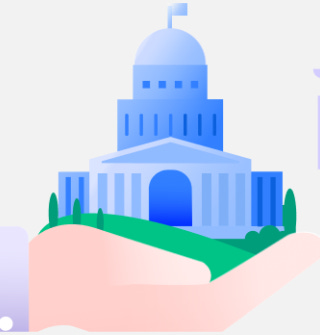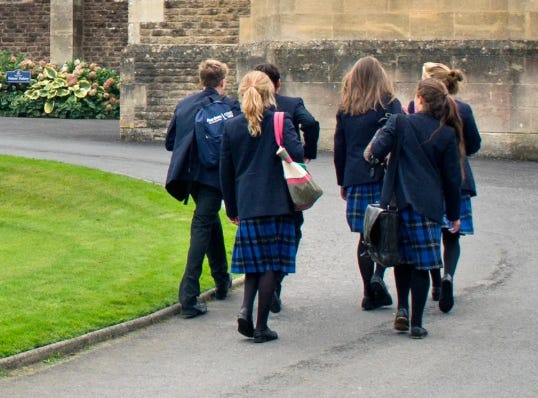By Tom McMahan
I. Believe in Democracy | II Defend Objective Truth | III Reform Public Education | IV Defend the Environment |
V Rebuild Communities | VI Practice Inclusivity | VII Uphold the Rule of Law | VIII Strengthen Institutions |
IX Respect Ethics | X Promote Positive Freedom

Democracy is “public government.” In economic terms, it is “non-rivalrous” and “non-excludable.” You could argue that all governments are “public” in that sense, but all other forms of governments rely upon the assumption that there’s an individual or group of people who are more qualified, more capable, or just more powerful and so deserve to rule over everyone else. Functioning democracies, even ones that fall short of the ideal, operate with the assumption that there is no such privileged group of people and are always striving to perfect themselves.
While I’m retired now, I was a public school teacher for 24 years. I went to public schools as a child; I went to a public university as an adult for my undergraduate and graduate degrees. I’m going to draw upon my experience as both student and teacher to explain two reforms we need in public education, the first technical in nature, the second more personal and philosophical.
I. ALTER THE CURRENT STANDARDS/TEST MODEL
The current arrangement of standards-based learning, combined with standardized testing, came into its full form over the course of my teaching career. While I don’t think there’s anything bad about having some written standards per se, or even giving standardized tests occasionally for “spot checking,” the standards as they currently exist, especially when combined with the standardized tests, cause teachers to unnecessarily rush through courses, and then spend 1-2 weeks with their students before the tests cramming what they rushed through during the semester back in to keep passing scores as high as possible. This is especially true in “content” areas like the sciences, both natural and social. (Some Georgia examples are provided here, here, and here as well as the economics link above.)
Most damning, this arrangement doesn’t allow teachers to effectively teach students how to think more deeply about the disciplines they’re studying. Is it more important for students to learn a set of disparate historical facts with little to no context provided, or is it more important for students to understand how the modern historical profession arrives at their conclusions as to what is most likely true?
I am arguing strongly for the latter instead of the former. (The same goes for science subjects, of course.) If you want students to be able to use digital-based information without consistently falling prey to the avalanche of misinformation and outright lies on the internet and social media, it requires training students not in singular facts (that all of them can easily look up now on their own anyway) as much as being able to effectively evaluate information and reach conclusions based upon where the evidence takes them.
II. RID OURSELVES OF ELITIST URGES THAT FAVOR PRIVATE SCHOOLS
Did you know that every failure of our society is the fault of public schools? Hey, that’s what I consistently saw and read over the course of my career! Those failures are never laid at the feet of private schools, are they? Even though, in recent years, more and more of the upper crust and decision-makers of our society have come from private education.

Has there ever been an Administration more filled with the byproducts of “elite” private schools…and more openly hostile to public ones…than the current Trump Administration?
Has there ever been an Administration as completely and utterly incompetent as the current Trump Administration?
No and no, if you’re following along at home.
And, yes, I’m explicitly linking elite private schools to the failures and threats to democracy we’re seeing today.
Or, more to the point, I’m explicitly linking the prevailing view that “private schools are good” and “public schools are bad,” which leads even some of those who nominally support public education to send their kids to private schools if they can afford to. Which, in turn, leads to things like vouchers, which further drain public schools of money and students, and ultimately builds a completely bifurcated society built on notions of elitism and access. And the products of that elitism don’t end up any better suited for governing, or even basic reasoning.
People like Trump and Musk grow into adulthood…and power…in school and home environments thinking that the world is theirs by birthright. Their extreme narcissism and selfishness shouldn’t come as a shock to us, then. Nor should their ridiculous flights of fancy devoid of fact…like Trump’s tariff plan…because they end up being surrounded by people craving access more than truth who never, ever say no to them.
My favorite example of the folly of this elitist thinking is the takedown of Musk’s nonsensical idea of “terraforming Mars” into Earth 2.0 idea, in less than a minute, by Neil deGrasse Tyson.
Which takes me back to the first paragraph of the article.
Plugging your kid into an increasingly disconnected, arrogant, and self-absorbed private school culture might give them a leg up in life.
It’s absolutely killing our democracy.
Is it really worth that?
No law is ever going to keep you from doing that.
It just comes down to a choice, and what matters most to you.
(NOTE: The next article in this series will be published in TWO weeks.)





Totally agree / former school teacher/ less testing / more recess!!
Tom, this is great. Thanks for your service as a teacher.
Jason Esteves looks like the strongest (and best!) D candidate for Governor, with a major background in K-12 education. What should be the D gubernatorial pitch? What about candidates for other state-wide slots?